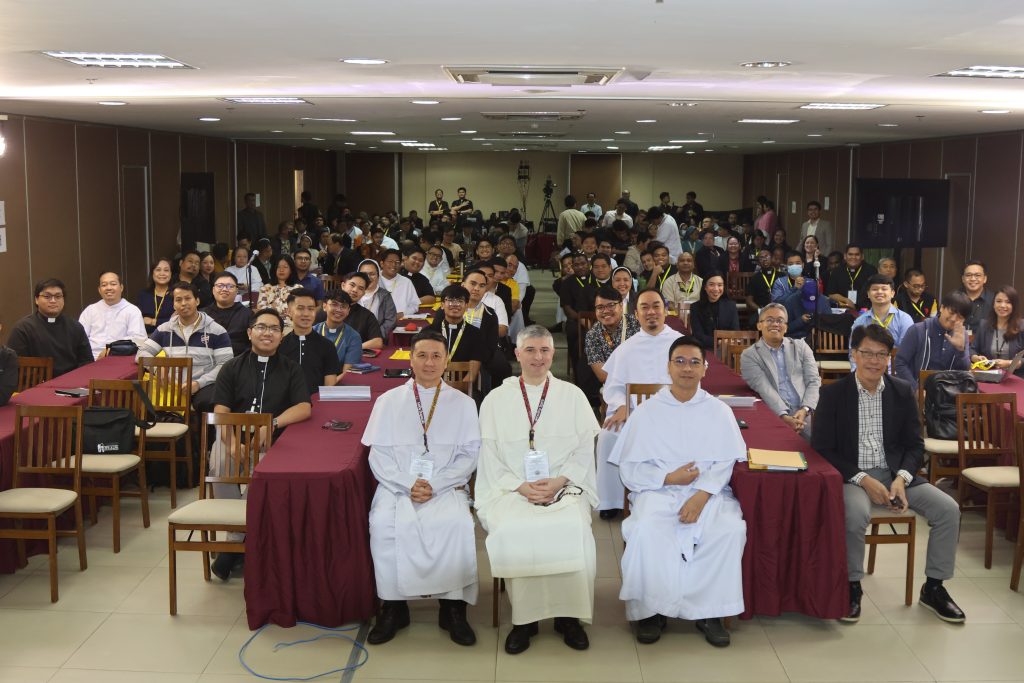The University of Santo Tomas (UST) successfully hosted the Aquinas Conference III with the theme “St. Thomas Aquinas, Doctor of Humanity – Dialogues on Religion, Society, and Becoming Human,” reaffirming its commitment to advancing Thomistic scholarship and its relevance in contemporary discourse. Held from February 13 to 14, 2025, at the George SK Ty Function Hall and online via Zoom, the event gathered esteemed scholars, theologians, and students to engage in critical discussions on the impact of Aquinas’ philosophy and theology in modern society.

As the oldest Catholic university in Asia, UST has long championed the study of Thomism, underscoring its significance in theology, philosophy, ethics, and education. The third installment of the Aquinas Conference is a testament to this mission, offering a platform to explore the relevance of Aquinas’ teachings in addressing contemporary societal issues. In his opening remarks, Very Rev. Fr. Richard G. Ang, O.P., Rector of UST, highlighted the University’s dedication to fostering critical thinking and dialogue through Thomistic principles. Fr. Felix delos Reyes, Jr., O.P., Coordinator of the Center for Thomistic Studies, likewise emphasized the importance of engaging with Aquinas’ works as we navigate present-day moral and intellectual challenges.
The conference featured three plenary lectures by distinguished scholars: Fr. John William Emery, O.P. (Pontifical University of St. Thomas, Italy) explored the topic “Saint Thomas Aquinas on God’s Presence in the Universe, in Humans, and in Christ”; Fr. Adrian Adiredjo, O.P. (Universitas Katolik Darma Cendika, Indonesia) delivered insights on “Aquinas on Prophecy: Integrating Faith and Reason”; while Rev. Fr. Nicanor Pier Giorgio Austriaco, O.P. (UST, Philippines) presented a thought-provoking discussion on “The Evolutionary Origin of Sapiens as a Natural Kind.”
Aquinas Conference III also provided a multidisciplinary approach to Thomistic studies through parallel panel discussions covering philosophy, technology, political praxis, education, and religious studies. Among the various themes discussed were “Aquinas and the Digital Age,” where scholars examined topics such as AI ethics, online liturgy, and spiritual apathy in the modern world; “Christian Philosophy and Political Praxis,” addressing contemporary socio-political challenges through Thomistic thought; “UST in the History of Thomism,” which shed light on the contributions of Thomasian scholars to global Thomism; and “Thomas Aquinas on Religious Education and Catechesis,” exploring the relevance of Aquinas’ teachings in modern religious instruction.
A timely reflection on faith, reason, and society. The conference underscored Aquinas’ enduring legacy to humanity in shaping ethical frameworks, education, and societal values. As UST continues to promote Thomistic studies, the Aquinas Conference will remain a cornerstone event, bridging medieval wisdom with contemporary discourse, as it promises to continue even beyond the Jubilee celebrations which end in 2025. Closing the event, Prof. Michael Anthony C. Vasco, Ph.D., Dean of the UST Graduate School, expressed gratitude to all participants and reiterated UST’s commitment to furthering the legacy of St. Thomas Aquinas, fostering a deeper appreciation of Aquinas’ thought in today’s ever-changing world.




